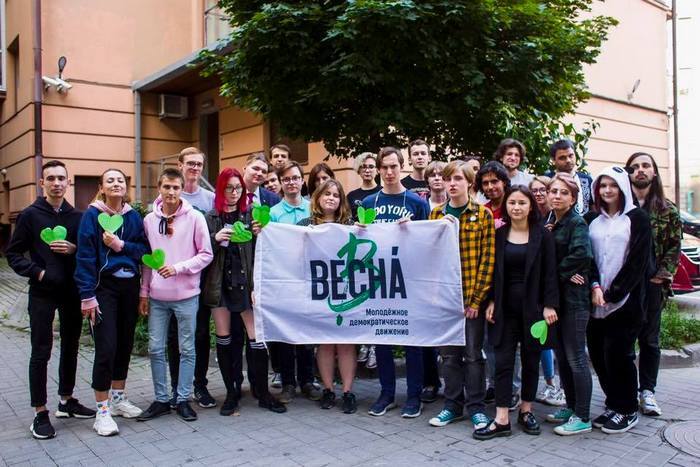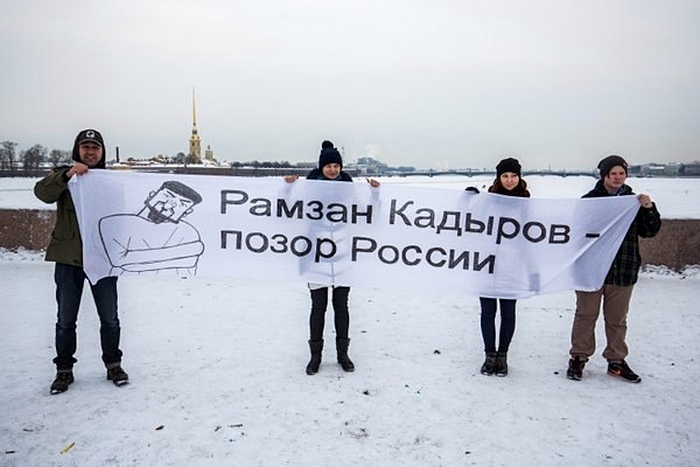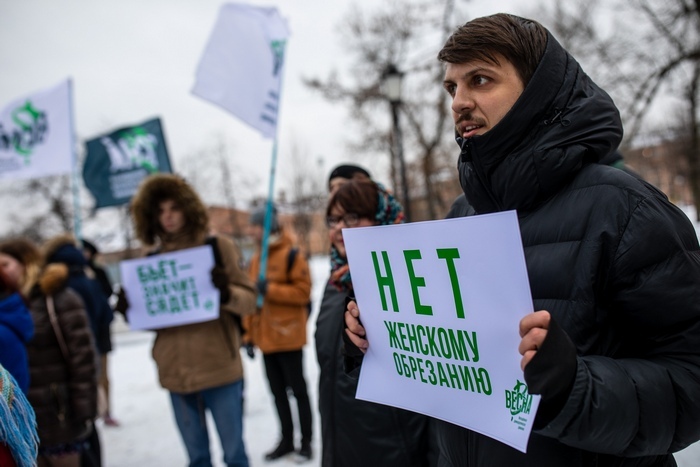The Russian authorities see the members of the Saint Petersburg organization Vesna (The Spring) as terrorists, extremists and foreign agents. After Russia’s invasion into Ukraine in 2022, some of the movement’s activists have become subjects in a criminal case for “creating a non-commercial organization infringing on identity and citizen rights.”
Before 2022, however, Vesna was primarily known for humorous political performances: the movement organized a “bribe relay race” within “Siphoning Games,” made fun of poor snow cleaning in Saint Petersburg and demanded night subway service.
Paperpaper.ru recounts the story of Vesna, from a community of local activists to leaders of the Russian anti-war movement.
Anti-war protest: how Vesna was included in the list of extremists
Saint Petersburg, February 24, 2022, 7 pm. The first protesters are convening for an anti-war demonstration near Gostiny Dvor metro station. It is +4 centigrade degrees outside, and sleet is falling on the black helmets of the riot police encompassing the square. As soon as anyone unfolds a picket sign, reporters and policemen come running: the former, to take pictures, the latter, to take that person in.
During two hours of this unequal contest, the reporter of Paperpaper.ru saw at least 130 arrests. In three weeks, no fewer than 4555 people were detained in Saint Petersburg and 14 906 throughout the country.
These spontaneous anti-war demonstrations did not have an organizer. However, among the first to urge people to take it to the streets was the Vesna movement, an activist group that had been known for witty political slogans and peaceful performance protests.
Previously a non-threat to the Russian authorities, this has made Vesna into a major coordinator of anti-war protests across Russian cities. The movement’s social media pages and Telegram channels became the source of information about dates and places of demonstrations; Vesna organized rallies and informed on various ways to protest, demanded impeachment of Putin and reversal of the “fake news” law, and published open letters.
The authorities’ response was quick and vigorous. On February 27, even before the clampdown on TV Rain and Echo of Moscow Radio, Vesna’s page on VK social network was blocked. On February 28, the movement’s national coordinator Bogdan Litvin was arrested for 25 days; in May, the police raided his apartment as well as residencies of other Vesna members in Saint Petersburg, Novgorod, and Moscow. On the same day, Vesna’s former press secretary Artem Uimanen and his ex-girlfriend Kamilla Dotsenko were arrested.
All of this resulted in a criminal case against Vesna under the charges of “creating a non-commercial organization infringing on citizen rights.” The investigation targeted Evgeny Zateev, Valentin Khoroshenin, Roman Maksimov, Ivan Drobotov, Angelina Roshchupko, and Timofey Vaskin. The court has put restraining orders on all of them.

Later on, new charges were brought for “inciting to riot.” In September 2022, after demonstrations against military drafting, the Saint Petersburg Public Prosecution Office demanded that Vesna be deemed an extremist organization, explaining that its “activities are aimed at disruption of social security and of constitutional principles of the Russian Federation.”
Bogdan Litvin
Vesna’s federal coordinator
“What we are charged with is the opposite of what we are actually doing. The prosecutors say we are offending the constitutional order, while in reality we are defending it from the government. We fought against the [2020] amendments, we have fought for respecting the Constitution, and we have followed the Constitution itself while doing so”
On October 11, Rosfinmonitoring, the governmental financial watchdog, included Vesna in its list of terrorists and extremists.
Liberty, equality, sanity: how Vesna came to be
Vesna was born from a rift within another political movement, the Yabloko Party. In the elections for the Saint Petersburg Legislature in late 2012, Olga Galkina and Vyacheslav Notiag had the highest results among Yabloko members, although the party had expected its veterans Mikhail Amosov and Alexander Belyaev to win.
The party’s federal leadership recommended that Notiag and Galkina withdraw from their mandates in favor of more experienced colleagues, but the winners refused. They received support from 22 members of the party, including Nikolai Artemenko and Anton Gorbatsevich from Saint Petersburg, who represented Yabloko’s youth faction and would co-found Vesna. The dissenters were expelled from the party.
Anton Gorbatsevich
co-founder of Vesna, who was on “the list of 22”
“Those people in Moscow told us we had to be cut off like gangrene. We heard a lot of ‘niceties’ from the party leaders Yavlinsky, Mitrokhin and Ivanenko”
On the heels of their departure, about 200 people, including Bogdan Litvin, also chose to leave the party. The Youth Yabloko in Saint Petersburg dissolved itself, with its most active members creating two new projects: The Young Democrats and Vesna.
10 to 12 people joined Vesna at first, according to the movement’s co-founder Nikolai Artemenko. The members installed a horizontal structure that had no chairperson and was ruled by a simple majority, while their declared values were “liberty, equality, and sanity.” The first meeting, Anton Gorbatsevich recalls, was held in the reception office of Maxim Reznik, member of Saint Petersburg Legislature. Gorbatsevich and Litvin were both working as his aides.
Nikolai Artemenko
co-founder of Vesna
“Yabloko took away from us an opportunity to do politics within the party, but we still wanted to do something and created an organization in order to appeal to active young people with critical thinking. We stood out for not being tied to a party structure and being independent from decisions of others”
There are conflicting accounts of how the name was chosen. Gorbatsevich says that it was proposed by Yabloko’s former member Alexander Gudimov. According to Litvin, “Vesna” (The Spring) won a vote against other possible names, such as “Radar” and “Lyudi” (The People).
Vesna’s first initiative came ten days after it was founded. They presented their own version of the “civil officer’s oath,” to be taken by every public servant before assuming office, to the Saint Petersburg Youth Policy Committee. The oath included pledging not to cut down public parks, demolish historical buildings, or have one’s children employed through backdoor influence.
Next up was a performance against a new registration law: in January 2013 Putin proposed upgrading penalties and even introducing criminal sanctions for residence registration offenses.
Bogdan Litvin
Vesna’s federal coordinator
“This was a solidarity effort to support demonstrators in Moscow. The anarchists came to a street protest with obscene slogans against the registration law, which was to be tightened. So we came to Palace Square with a sign showing that we in Saint Petersburg are different from Muscovites [in being more polite] but support their demands. The sign said: “Gentlemen, woe be unto you and your registration laws!”
Political happenings became Vesna’s trademark. Litvin says the movement members thought it was the most intelligent and interesting form of political statement.
Anton Gorbatsevich
co-founder of Vesna
“At the moment, there was no youth political activism in Russia to speak of. The Voina Group was too radical for us. As much as we admired their happenings “Dick Captured by the FSB” and “Palace Coup”, we have promoted non-violent resistance inspired by the Otpor! group [in Serbia] and Pora! [in Ukraine]. Overturning cars [as Voina did in “Palace Coup”] is a violent act, even if it’s conceptualized”

The chief aim of Vesna’s activities is media exposure, Nikolai Artementko explains. The audience of a solo picket in 2013, before this form of protesting was oppressed, would be a thousand people at best, while “theatricalized happening is guaranteed media coverage and could reach thousands or even hundreds of thousands.”
From St. Isaac’s to the Constitution: Vesna’s most famous campaigns and what came of them
Eventually activists from other cities began joining the movement. Litvin says that an influx of supporters happened on a different occasion at each particular place, triggered by different activities.
In ten years of its existence, Vesna called attention to siphoning funds from the 2014 Olympics and to the environmental disaster in Shies; protested against the retirement-age increase and against the practie of female genital mutilation; supported the journalist Ivan Golunov and the LGBT community.
Vesna’s most famous nationwide activities in 2013—2021:
- “Siphoning Games,” a series of happenings against embezzlement during the preparation for the 2014 Olympic Games: activists ran on a quay with a burning saw [a reference to Russian informal term for embezzlement, literally translated as “sawing”], organized a competition in “election promises throwing,” and a “bribe relay race.”
- In January 2016, activists displayed a poster saying “Ramzan Kadyrov is a disgrace of Russia” in the center of Saint Petersburg.
- “The grave of the unknown soldier killed in the Donbas”: in the Summer of 2015, activists installed a tomb of the unknown Russian soldier who died in Ukraine [Russian authorities denied participation of the Russian Army in the war in Eastern Ukraine].
- The Free Internet Campaign, which included several happenings and rallies.
- “This World Cup is filled with blood”: the day before the 2018 World Cup’s final game, activists displayed a poster with these words on the Palace Bridge as a reminder about political prisoners in Russia.

In Saint Petersburg, Vesna’s most memorable local initiatives included protesting against the handover of St. Isaac’s Cathedral to the Russian Orthodox Church, and demanding night-hours transportation service.
Nikolai Artemenko
co-founder of Vesna, leader of the metro night service campaign
“We carried out a wide campaign that resulted in creating night bus service and train service between Admiralteyskaya and Sportivnaya [metro station] during night hours. Obviously, the authorities never admitted that it was done because of Vesna’s effort, but we were very proud of the campaign, which was very vibrant and successful”
The shuttle train connecting two parts of the city during night hours was discontinued in late 2019. In the Spring of 2020, city authorities decided against resuming it because of the pandemic, and the service has never been restored.
Vesna’s most famous activities in Saint Petersburg:
- In 2015, activists presented a shovel as a gift for Vice Governor Igor Albin who was responsible for snow clearing in the city. In 2019, they posted slogans “Getting injured like a real Petersburger” in the subway. The snow clearing problem has not been solved by 2021.
- Vesna organized annual activities to commemorate the victims of the Siege of Leningrad and of the Beslan school hostage crisis.
- Vesna’s activists participated in defending the Dolgoozernaya public park (which was eventually developed), the South Neva Bay preserve (which was saved), and the Kanonersky Island headland (creation of a public park was proposed but never materialized).
- Rally against naming a bridge over Dudergof Canal after Ahmat Kadyrov. The protest was unsuccessful.

Anton Gorbatsevich thinks that Vesna became, among other things, a training ground for activists. “Young people came to work with us and then realized they wanted to work on a particular issue, such as helping the homeless or the children of migrants, for instance,” he explains.
Until 2021, the movement organized the summer camp Territory of Freedom and annual meetings under the title “Year’s results in politics,” assembling various oppositional forces, activists and journalists. The organizers say they never had any other funding except for the participants’ contributions.
There was a rift inside Vesna after the city legislature elections in 2016. As a result, Nikolai Artemenko and Anton Gorbatsevich left to create a new movement, Vremya (Time).
Bogdan Litvin
Vesna’s federal coordinator
“At the time when Vesna was founded, I was among its youngest members. There also was the generation that had been in the Youth Yabloko in the 2000s. We had differing ideas of a political language, of liberal values, of ethics. So we split into more idealistic, forthright activists and those who were ready to make some compromises”
Five years after the split, activists of Vremya and Vesna keep supporting each other’s initiatives.
“An exemplary campaign”: how Vesna responded to the annexation of Crimea
Vesna, which specialized on creativity and performance, always maintained a political focus and has reacted to events in Ukraine since late 2013.
The violent crackdown on the Euromaidan protests prompted Vesna activists to respond with solo pickets near the Ukrainian Consulate in Saint Petersburg. The protesters were displaying a sign that read “Yanukovych, this is what awaits all those waging war against the people,” accompanied by photographs of the dead Mussolini and Ceausescu.
After the “referendum” in Crimea, Vesna urged citizens to join an authorized anti-war demonstration on the Field of Mars in Saint Petersburg on March 8, 2014. Members of Vesna have consistently protested against the war in Ukraine ever since.
Bogdan Litvin
Vesna’s federal coordinator
“After the revolution won in Ukraine, Putin initiated the war. In our opinion, it began in 2014 with the occupation of Crimea. We knew very well that it was against everything we stood for, and those events were absolutely unacceptable for Vesna”
In response to the “referendum” in Crimea, Vesna organized its own plebiscite “on reunification of Saint Petersburg with Europe as a commune in the Principality of Liechtenstein.”
Anton Gorbatsevich
co-founder of Vesna
“There was a short period of time between the Crimean “referendum” and the separatism law [criminalizing appeals for secession from Russia]. So in April we decided to hold a heavily ironic referendum. We chose Liechtenstein instead of Finland to make sure it’s not taken in earnest. We formed an initiative group, prepared the paperwork and brought it to the electoral board. A major shitstorm ensued, propagandists went ballistic. We were called traitors and lots of other nasty things. An exemplary campaign”
None of these stunts had any consequences, the activists were not persecuted. Bogdan Litvin is convinced that, until February 24, 2022, the authorities did not see anti-war statements as a threat.
““People expected a call to action”: how Vesna took the lead of the anti-war resistance
In the Russia past February 24, 2022, there is no network of Navalny’s offices, and oppositional leaders—Alexey Navalny, Andrey Pivovarov, Ilya Yashin—are jailed; in these circumstances, Vesna has effectively taken the lead of anti-war protests together with the Feminist Anti-War Resistance.
Bogdan Litvin thinks that Vesna came to be perceived as the coordinator of demonstrations in Saint Petersburg because it had actively covered the rallies on Telegram. The movement’s members then began to actually coordinate the demonstrations: “People expected a call to action from us, and we’d had a lot of experience organizing protest activities, and we knew this was our moral duty.”
“Other major political actors had simply ceased to exist, people needed someone to turn to, and Vesna responded to this demand,” says the movement’s former member Nikolai Artemenko.
Journalist and Vesna member Yekaterina Goncharova agrees: “After Open Russia was shut down and Navalny’s network deemed extremist, Vesna remained the only major movement of the opposition.”
Artemenko emphasizes that 95% of the movement are twenty-somethings. “It’s young, hot blood, that fears nothing, knows no barriers, and has a heart for protesting. Most of them are outside Russia, which removes certain barriers.”
After the beginning of the war, Vesna abandoned political actionism in favor of organizing mass demonstrations: this decision, according to Litvin, was driven partly by concerns over the members’ safety.
Bogdan Litvin
Vesna’s federal coordinator
“Happenings and mass demonstrations carry different risks. The risks are higher for happenings. If we do a performance of the kind we used to do, activists will be criminally prosecuted. Demonstrators are only liable administratively. It means that, to a certain extent, demonstrations are safer than actionism”
When asked if it was ethical or safe to call people to take to the streets, former candidate for city legislature Irina Fatianova says that Vesna members “stayed in Russia as long as it was possible” and took the risks themselves. The activists who remain in Russia think that those who have left should be calling people to protest, as it is safe for them to do it.
Bogdan Litvin asserts that Vesna is going to fight for the movement’s values: “We can’t tell in advance which form the fighting is going to take, because the situation is so volatile, but it is certainly going to be a non-violent form of protest.”
Vesna’s Yekaterina Goncharova confirms that the movement will continue its anti-war campaign, although at this point they don’t know yet how to proceed. She says that, after the movement is deemed extremist, Vesna’s symbols will likely be outlawed and its members will have to consider the risk of criminal prosecution.
As of now, part of the movement’s organizers and members are staying in Russia, while others are abroad. They are talking to lawyers to assess the risks of street demonstrations and discussing the next steps.
Bogdan Litvin
Vesna’s federal coordinator
“We would like to have a society strong enough to end the autocratic regime. We shouldn’t be making predictions, we need to work. And we’ll keep doing it, because we aren’t the kind of people who think you can just sit it all out”
Paperpaper.ru — is independent media from Saint-Petersburg, Russia. We’ve been reporting on the Russian-Ukrainian war since the day it started. As a result, our website was blocked by the Russian government.
For ten years we’ve been writing about the local community, business and initiatives. Yet, our main goal was always to improve life in the city we love.
We are Russian-language media but now we translate our the most significant articles to share it with our English speaking audience. Help independent journalism — save the freedom of speech!
